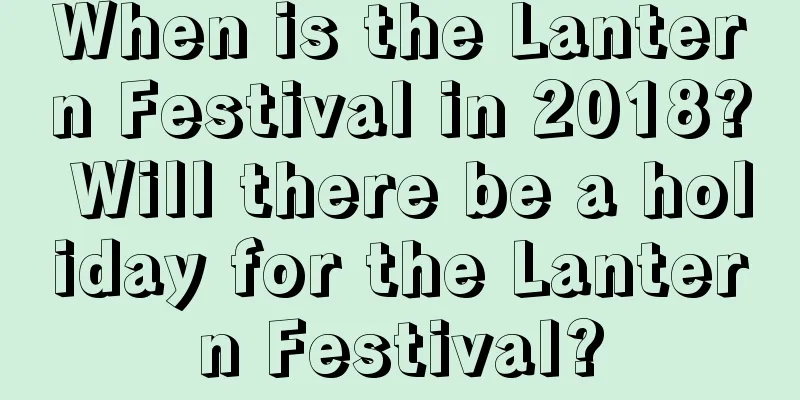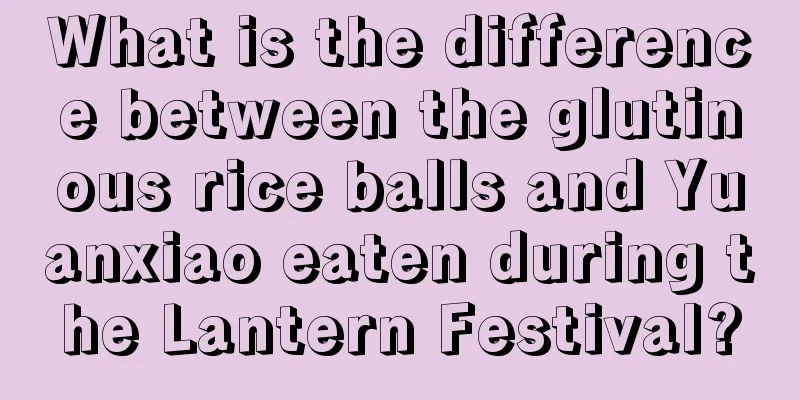When is the Lantern Festival in 2018? Will there be a holiday for the Lantern Festival?

Introduction: In the traditional culture of our country, folk culture occupies a certain important position, and therefore there are many traditional festivals and etiquette. So when is the Lantern Festival in 2018? Will there be a holiday for the Lantern Festival? For more details about the 2018 Lunar New Year calendar, please visit the Fortune Teller website for consultation!When is the Lantern Festival in 2018?Friday, March 2, 2018 (the 15th day of the first lunar month in the Year of the Dog, 7 days away from the 2018 Lantern Festival)The Lantern Festival, also known as the Shangyuan Festival, the Little New Year, the Yuanxiao Festival or the Lantern Festival, is the first important festival after the Spring Festival. It is one of the traditional festivals of China, the regions in the Chinese character cultural circle and overseas Chinese. The first month of the lunar calendar is the first month of the year. The ancients called the night "xiao", so the fifteenth day of the first full moon night of the year is called the Lantern Festival. Will there be a holiday for the Lantern Festival?The 2018 Lantern Festival is on Friday, March 2nd, and there is no holiday.The 2018 Spring Festival holidays are from February 15 (Thursday, New Year’s Eve) to February 21 (Wednesday, the sixth day of the first lunar month), a total of 7 days. Officially started work on February 22nd. Legends about the origin of Lantern FestivalThe Lantern Festival, also known as the Shangyuan Festival, the Little New Year, the Yuanxiao Festival or the Lantern Festival, is the first important festival after the Spring Festival. It is one of the traditional festivals of China, the regions in the Chinese character cultural circle and overseas Chinese. The first month of the lunar calendar is the first month of the year. The ancients called the night "xiao", so the fifteenth day of the first full moon night of the year is called the Lantern Festival.In ancient Chinese customs, the Shangyuan Festival (Tianguan Festival, Lantern Festival), the Zhongyuan Festival (Diguan Festival, Yulan Festival), and the Xiayuan Festival (Shuiguan Festival) are collectively known as the Three Yuans. The Lantern Festival began in the Qin Dynasty more than 2,000 years ago. Emperor Wen of the Han Dynasty issued an order to designate the fifteenth day of the first lunar month as the Lantern Festival. During the reign of Emperor Wu of Han, the worship activities for "Taiyi God" were set on the fifteenth day of the first lunar month (Taiyi: the god who dominates everything in the universe). When Sima Qian created the "Taichu Calendar", he had already designated the Lantern Festival as a major festival. Traditional customs include going out to admire the moon, lighting lanterns and fireworks, guessing lantern riddles, eating Yuanxiao together, pulling rabbit lanterns, etc. In addition, many places have added traditional folk performances such as dragon lantern and lion dances, stilt walking, land boat racing, yangko dance, and Taiping drum performances to the Lantern Festival. Legend has it that the Lantern Festival was established during the reign of Emperor Wen of Han to commemorate the "suppression of the Lü clan." After the death of Emperor Gaozu of Han, Liu Bang, Liu Ying, the son of Empress Lü, ascended the throne as Emperor Hui of Han. Emperor Hui was cowardly and indecisive by nature, and power gradually fell into the hands of Empress Lü. After Emperor Hui of Han died of illness, Empress Lü took control of the government and turned the Liu family's empire into the Lü family's empire. The old ministers in the court and the Liu family were deeply indignant, but they were afraid of Empress Lü's cruelty and dared not speak out. After Empress Lü died of illness, the Lü clan became extremely worried and fearful of being harmed and ostracized. So, they secretly gathered at the home of General Lu Lu and conspired to make a rebellion in order to completely seize the Liu family's kingdom. This matter reached the ears of Liu Xiang, the King of Qi, who, in order to protect the Liu family's kingdom, decided to lead an army to attack the Lü clan. He then contacted Zhou Bo and Chen Ping, two of the founding ministers, and designed a plan to remove Lü Lu. Finally, the "Lü Rebellion" was completely put down. After the rebellion was quelled, the ministers supported Liu Bang's second son Liu Heng to ascend the throne and call him Emperor Wen of Han. Emperor Wen felt that peace and prosperity were hard-won, so he designated the fifteenth day of the first lunar month, when the "Lu Rebellion" was quelled, as a day to celebrate with the people. Every household in the capital decorated their houses with lanterns and streamers to celebrate. From then on, the fifteenth day of the first lunar month became a folk festival celebrated throughout the country - "Lantern Festival". During the reign of Emperor Wu of Han, the sacrificial activities for "Taiyi God" were set on the fifteenth day of the first lunar month. (Taiyi: the god who dominates everything in the universe). When Sima Qian created the "Taichu Calendar", he had already designated the Lantern Festival as a major festival. Summary: The above content is about [What day is the Lantern Festival in 2018? Will there be a holiday for the Lantern Festival? 】Problem analysis, hope it can help everyone! |
Recommend
Is the third day of the tenth lunar month in 2019 an auspicious day for marriage?
Is the third day of the tenth lunar month in 2019...
In which direction is the God of Happiness on July 19, 2020?
In which direction is the God of Happiness on Jul...
Is the fate of a child born on August 26th of the lunar calendar good? Become very rich and powerful?
Introduction: Every day is new, and new life is bo...
Is the fate of a boy born on May 24th of the lunar calendar in 2019 good or bad?
The birth of a child is a great blessing from God ...
Is the fate of people born at Chou hour on the fourth day of May in 2019 good?
People born at different times have different dest...
How many days are there in the dog days of summer in 2020? When does the beginning of the dog days of summer in 2020 begin?
Introduction: The dog days of summer is a hot peri...
How many days will highways be free during New Year's Day 2019? How many days are left until New Year's Day 2019?
Introduction: New Year's Day is an important s...
Is the summer solstice of 2019 the first day of the dog days? Why do we eat dog meat on the summer solstice? What is the saying?
Introduction: The summer solstice is one of the 24...
Is August 14th of the lunar calendar in 2020 an auspicious day? Is it suitable to pick up the car?
Each season has three months: Meng, Zhong and Ji,...
Is it a good idea to install a bed on the eighth day of the eleventh lunar month in 2019? Analysis of the Feng Shui do's and don'ts for installing a bed!
Introduction: It is generally necessary to choose ...
Is the twelfth day of the first lunar month in 2020 an auspicious day for praying?
Is the twelfth day of the first lunar month in 202...
What will the second day of the sixth lunar month be like in 2020? What are the auspicious and inauspicious things to do?
June is also known as the hottest month of the ye...
Is it necessary to give carnations on Mother's Day? What color carnations are good for Mother's Day?
Introduction: Giving carnations on Mother's Da...
What is the lunar calendar for the fifth day of the twelfth lunar month in 2020? What are the do’s and don’ts?
In addition to the twelfth month of the lunar cal...
What should we do and not do on the 15th day of the seventh lunar month in 2020?
What should we do and not do on the 15th day of t...









